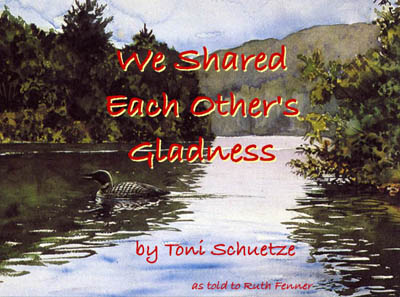
  
CHAPTER 11 - Town Living
On the international scene, 1945 was a momentous year. In Europe the Allies had won the war. In the Pacific the war lasted a little longer; in August the Japanese sued for peace also. Everywhere around the globe, families and friends anxiously awaited the arrival home of loved ones who had been away for too long.
On the home front, the national economy was strong, and plans were being made to bring the returning soldiers, sailors and airmen into the work force. In Berens River, Rod and Toni observed these events, watching and listening for a new line of work for Rod.
The Manitoba Paper Company was expanding, looking to the future when world peace would produce a stronger consumer-based economy, and paper products would be in greater demand. Their plant at Pine Falls, on Winnipeg River, was in the throes of change. Recently they had purchased a landing barge from the Federal Government's supply of surplus military equipment. Originally designed for ferrying soldiers, now that the war was over, corporate and private business had an opportunity to see if they could use these in their enterprises. Company officials had plans to utilize the barge to haul logs from their logging areas to the plant, employing the barge on the waters of Lake Winnipeg. A more immediate concern, however, was assembling the barge - no instructions came with it, and they could not seem to locate anyone with any experience or practical knowledge that could be applied to their dilemma.
The Manitoba Paper Company had also purchased a diesel tug, and their resident mechanic knew nothing of diesels. Rod responded to the firm's call for a mechanic with diesel experience - his years with the Patricia Transportation Company had made him conversant with diesel motors of all types. Rod was hired.
Reasoning that someone with Rod's broad experience and knack of inventiveness perhaps could help them with the barge, (Picture 11 - 1) the company first set him the task of assembling it. After some trial and error, Rod did so - but, unfortunately, the Company, in time, found the whole idea of using the barge to haul logs was not practical.
Picture 11-1 The barge that Rod assembeled for the Manitoba Paper Company, Pine Falls, Manitoba

Rod's capabilities in handling the diesel motors and other equipment the company used exceeded the expectations of the management and Rod was very soon an integral part of their maintenance team. For the first time in his life, his employment was solid - the Company came to rely on him more as time passed, and, in the end, Rod worked there fifteen years, until his retirement.
Rod started working in Pine Falls during the summer school recess. Toni and the children remained in Berens River, because available housing in Pine Falls was at a premium. September arrived and the children and Toni once again started correspondence school lessons. Rod wrote, telling of a house just outside of Pine Falls that he would be able rent - Toni should start packing and making the arrangements to move the family and their belongings.
One Tuesday in October when the Keenora was berthed at the Hudson's Bay post, Toni was there to talk with Captain John Hokansen and Purser Tom Peers. Both men were friends of long standing, and knew of the Schuetze's planned move. Captain Hokansen had bought one of their freight canoes, complete with the outboard motor and sail, and Toni talked with the two men about its delivery, and about the remaining sailings of the Keenora during the current season. They urged her to be prepared when the vessel returned to Berens River late on Thursday, since there was a strong possibility this trip would be the last sailing of the season.
Making her plans en route back to the cabin, Toni stopped to talk with Constable Newton, the resident Mountie. "There are two things I have to look after before we leave Berens River, and I will need some help. We cannot take Micky into a town setting - he is a settlement dog and would be very unhappy in town. Unless I can find him a good home, I'll need to have him put down."
"Well, I know he is good with children, and our boys have been after us to get them a dog. If you are agreeable, we'll adopt Micky."
Toni breathed a sigh of relief. "Rod and the children will be so pleased - I'm glad Micky will be with you. Promise me though, that you won't give him to any one else - when you can't keep him any more, please put him down."
The Constable smiled and consented. "You said you had two items to take care of?"
"Yes, we are leaving on the Friday sailing of the Keenora, and I don't see how I can have everything ready by then. I know so little about Rod's radio and it's batteries, and so on, that I am concerned about how to pack it," she replied.
"I'll do that for you. I'll come by the cabin some time tomorrow and get it ready to go. We're going to miss you and Rod and your children, but we can understand your reasons for moving."
"We'll miss Berens River and the people here," Toni responded with a sorrowful look. Then her expression brightened as she added - "We haven't sold our property here, and we are taking one of the freight canoes. We will be back during the summers when Rod's job permits, and we plan to come home again, if and when this job comes to an end. We want to retire right here!"
The following day, when Constable Newton had packed the radio equipment ready for the move and ascertained there was nothing further he could help Toni with, he took his leave of her and the children, and putting Micky in his canoe, shoved off for home. It was a tearful separation - tears from the children on the shore, and if Micky could have produced tears, there would have been a sizable puddle in the canoe.
Wistfully, Toni gazed at the little settlement as it receded from sight. They had lived in Berens River for over sixteen years. Memories flooded back - the building of their small cabin after the forest fire at Poplar River -- waiting for Rod's return from Winnipeg after his surgery -- the laughter they had shared as the children were growing up. Faces of friends left behind - like Constable Newton and Jack McEnery who had helped her these past few very busy days.
Returning to the present, Toni thought of their goods, all stored aboard the ship; and of Rod, waiting for them in Pine Falls. The children's laughter and eagerness to get on with, what to them was a great adventure they were embarking on, helped to allay her doleful thoughts on leaving Berens River.
That night at dusk, Captain Hokansen invited Toni and the children to the pilot house. As they walked down the corridor of the ship, Toni was unaware the girls had brought their pet turtles along for the visit. Hearing a stewardess coming towards them, the girls released the reptiles, who clattered down the wooden aisle with a great racket, eliciting a scream from the ship's employee.
As they neared Winnipeg, Toni's thoughts turned more to Rod and the future. Pine Falls was a growing community - who could know what triumphs and trials their time there could include. From Winnipeg, the family travelled by bus to Pine Falls where Rod met them. Their main luggage and other goods would follow in a few days, but for this first night, the arrangements in their rented home, in their new town would be rather make-shift. With sleeping bags and other bedding Rod had brought with him, they slept as best they could on the floors. Next morning, the whole family took a tour of the town - and especially the stores, where they bought many necessities - beds, a kitchen range, and numerous other items.
Toni's first priority was to establish the girls in school. Toni had been supervising their education by correspondence lessons through the Department of Education. Here the girls would be in regular classrooms, with qualified teachers. A visit with the school principal produced both concern and reassurance. He told Toni, in a very straight-forward manner, that correspondence students entering town schools were usually set back one year. The reasoning behind this action was lessons were normally not learned as well at home as in the classroom, and therefore the correspondence students lagged behind their urban counterparts. Toni did not feel the girls should be dealt with in this way, and said so. The principal set the girls this challenge: all the students were now writing October examinations - if the Schuetze girls also wrote them, and their marks were acceptable, they could continue in the grades they had started by correspondence. If not, they would have to enter a lower grade. The challenge was accepted, and the results showed the teachers and the principal that the girls were well prepared to be in the grades Toni had named, and the issue was settled.
Helping with homework, then as now, was a problem for parents. Rod had never studied algebra, but Toni had. When Eileen or Helen encountered in their homework, an algebra problem they could not solve, their parents endeavoured to help them. When Toni was stumped, Rod would solve the problem by mathematics, then Toni, armed with the correct answer, worked back and was able to help the girls solve it by algebraic methods.
All three youngsters developed friendships with individuals of their own age group. One July 1st weekend, Ray invited a military friend, Bobby Long, to spend the weekend with him. Rod and Toni had plans for the day, but the girls decided they would stay home and help Ray entertain his friend. When Bobby had left the military base, his buddies had all laughed and said, "Oh, yes, you're going to visit friends! You're just off to a party you don't want to tell us about!"
Eileen, at that time, was working at a restaurant across the road from the Schuetze home. So that Bobby could counter his buddies jibes, Ray snapped a picture of Bobby and Eileen outside the restaurant. Showing it to his friends later, Bobby was told: "You should have stayed in Pine Falls and sent Eileen back!"
Rod's employment kept his days and weeks very full. Working five and a half days a week, and being on call on Sundays left little time for travels with the family or other activities. Rod and Toni bought a small cottage on Nutimik Lake in Whiteshell Forest Reserve. Usually, Rod worked until noon on Saturday, so they planned their weekend get-aways with care. To avert a last minute call-out, Toni would have sandwiches prepared when Rod arrived home at noon. They quickly loaded the car and left, eating their sandwiches as they motored along (Picture 11 - 2).
Picture 11-2 The Schuetze family with their first automobile

Once at the cottage, starting the coffee pot was the first task. Here, as everywhere else they had lived, Rod took a keen interest in the native birds and animals. The chickadees of the area came to know Rod, and understood that he carried peanuts in his pockets, just for them. The customary greeting Rod and Toni received when they travelled to the cottage was given as soon as they exited the main road onto the trail leading to the cabin - a huge flock of chickadees swooped down on the car, and fearing he might hurt some of them if he drove on, Rod stopped and fed them, many eating right out of his hand (Pictures 11-3 and 11- 4).

Picture 11-3 and 11-4 Rod with some of his feathered friends, they made shooting very difficult!

On one visit to the cottage, as Toni was busy preparing coffee, they noticed a serviceman working at an adjoining property. Toni urged Rod to invite him in, and the three sat and visited as they enjoyed the hot beverage. The serviceman mentioned the numbers of chickadees around the cabins; the conversation quickly turned to Rod's friendship with the birds and the ways in which he fed and cultivated them. Their guest laughed, saying he thought there must be someone around who the birds were quite at ease with. He went on to tell as he was sitting in his truck earlier, eating his lunch, he had rolled the window down to get some fresh air, and unwrapped his sandwich. He took a bite, rested his hand on the steering wheel, and a chickadee flew in, sat on his hand and "helped himself to my sandwich!"
Over the years, Toni had made frequent trips to Winnipeg for dental work, and to shop for sewing fabrics and other necessities. From Pine Falls she travelled by bus; each trip was a highlight, a full day in the city, quite a change from the quiet existence at either Berens River or Pine Falls. One trip, Toni decided to wear her silver fox stole. Some years before, Rod had been trapping and caught a silver fox on her birthday, which he gave to her as a birthday gift. It was her decision whether she sold it, or had it made into a stole. The pelt was a beautiful dark silver, and all her feminine urges came to the fore: to sell the pelt would mean the money would likely be spent on day-to-day expenses, and the 'gift' would be gone. On the other hand, a stole would be something to enjoy for many years - perhaps something to pass on someday, as a family heirloom. Toni decided she wanted the stole. Rod arranged for the fox pelt to be delivered to a prominent furrier in Winnipeg, where fur fashions were designed, sewn and sold. In due course, Toni received her stole, and treasured it, having no opportunity to wear it. Now the time was right - she would wear it to Winnipeg - it was her turn to step out in style! She felt regal in the city - and relished the confidence and pleasure her treasure brought her. The day became warm, she carried the stole on her arm, and coming home on the bus, it rested on her lap. To her great chagrin and disappointment, when she arrived home, she discovered the fox stole had shed hair all over her dark suit!
Rod's work filled his days, and sometimes his evenings and weekends, also. He was head mechanic for the Woods Department, overseeing numerous pieces of equipment (Picture 11 - 5) their maintenance or repair, checking on how they were being utilized, and keeping records for each machine. In time he found some tractor parts required replacing more often, and prepared a parts order to the company's suppliers in Winnipeg, in an effort to stockpile a supply. If the parts were on hand and he did not have to wait the two or three days it took for parts to arrive from Winnipeg, he could have the machines back on the job quicker. Each part order Rod issued required the signature of his boss, who did not share Rod's ideas on greater efficiency. Scratching Rod's orders for extra parts produced frustration in Rod, and in time, friction between departments over equipment not being available as quickly as was needed.
Picture 11-5 Some logs at the Pine Falls outlet of the Manitoba Paper Company, with one of the 'alligator boats' used to move the logs in the water

Rod often travelled into the bush where the trees were being cut to be hauled to the mill (Picture 11 - 6). These trips were to check on equipment - he had the added responsibility of seeing that each tractor, snowmobile and so forth, was used for its prescribed purpose. Once he found a snowmobile that had been left at the side of the river - the snow had melted and the operator was not able to drive it back to the equipment yard. On checking things over, Rod determined the snowmobile had been used to haul logs from the river onto the shore - a task for one of the smaller tractors, of which the company had a number on hand (Picture 11 - 7).
Picture 11-6 Stockpiles of logs at the Pine Falls mill

Picture 11-7 An early days log hauling operation

Each department head was required to keep the costs for his section as low as possible. When a foreman used a large tractor, his department was charged an hourly rate set by the company. When a machine broke down and went into the shop for Rod to repair, the time it was out of service was charged against Rod's department. Each man wanted the best for his section of the work, and abuses, at the expense of another department, were numerous. Just as the snowmobile was not to be used to haul logs from the river, so were the small tractors not be used for bulldozing trees. Infractions of the rules were frequent, and usually resulted in a breakdown that Rod had to repair. On more than one occasion, Rod fired employees over issues such as these.
The family did return to Berens River on vacation - and Rod and Toni relished the voluntary return to the community via the river and freighting canoe they had kept. They had not forgotten their river and camping skills. Some photos from these last family outings are treasured (Picture 11 - 8, 11 - 9, 11 - 10).
Picture 11-8 Lunch break along Lake Winnipeg

Picture 11-9 Beauty palours are where you make them

Picture 11-10 Eileen and Toni, on the shore of Lake Winnipeg

In 1949, Eileen graduated from high school and was awarded the Gold Medal from the Rebecca Lodge, marking her scholastic achievement. All the family was proud of her; in the autumn she left for Winnipeg, to enrol in science courses at the University of Manitoba. Helen continued high school in Pine Falls, and Ray lived with the family most of the time, working at janitorial and sales jobs around town. When Ray secured a summer job at Churchill, Manitoba, Rod and Toni knew their time together as a family was very limited - soon the children would all be away, making their own ways in he world. Earning a Bachelor of Science, Eileen graduated from the University of Manitoba in 1952. She secured a job at the cancer laboratory in Winnipeg, and was only home on special occasions. Eileen and a girlfriend shared living accommodations in the city, and when Helen graduated from high school, everyone thought it was a good idea for Helen to join the other two girls in Winnipeg. Rod and Toni urged her to consider attending university - on Rod's salary they could afford it, and they wished to offer both daughters as much education as they chose to attempt. Helen moved in with Eileen and her friend, but soon married, and was off in pursuit of her own happiness.
Their little cabin at Nutimik Lake provided Rod and Toni with an opportunity to once again enjoy the tranquillity Rod had surrendered by taking a job in town. Here Rod could relax and enjoy nature and nature's creatures. His first success with taming the fauna of the area was with the chickadees. He also loved the chipmunks and squirrels that abounded in the area adjacent to their cabin. He began carrying peanuts for them (Picture 11 - 8A). He bought the unshelled variety, and alternately fed and coaxed the chipmunks until they became so tame they would climb the leg of his pants and crawl into his pockets to find and carry away their share of the nuts. Toni laughed as she recalled one warm afternoon when, clad in pedal pusher pants, she was on a ladder cleaning windows and a chipmunk decided to check her pockets for peanuts. His claws were very sharp on her bare leg, so she swatted at him with her cleaning cloth. A minor slap with some cloth was not about to discourage him from his prize - ultimately, Toni was the one to give in - she found jobs to do indoors, waiting to clean windows until the chipmunk was elsewhere, or Rod was at hand to occupy him.
Picture 11-8A Rod feeding a chipmunk. The photo won a photography prize in the Pine Falls fair
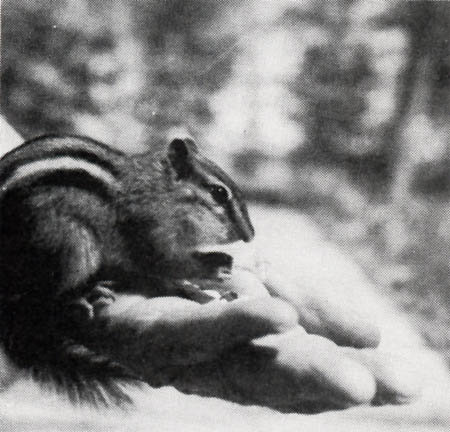
One chipmunk was a little braver than the others. When he found Rod had many nuts in his pocket, he decided to store as many as possible for the winter ahead. Crawling into Rod's pocket, he chose a nut, but found he did not have enough room to manoeuvre it properly. He crawled back out of the pocket, sat on Rod's hip as he stuffed it into one cheek, then scrambled back into the pocket for another nut. Once more he clawed his way out, sat on Rod's hip and filled his second cheek. Returning for a third peanut, he held that in his mouth, half of it sticking out. Loaded down, he dashed off to his hiding place, and hastily returned for more. Rod noticed that an enterprising squirrel noted the chipmunk's cache and made off with his nuts while the chipmunk was helping himself to Rod's supply!
Others who owned cabins in the area used them only during the summer, the Schuetze's weekended in their cabin in all seasons. On a winter trip, Toni made soup and after having boiled the bone down, set it outdoors to cool before disposing of it. Rod glanced through the window to check on the bone, and was thoroughly amused to see a weasel trying to carry it away. The challenge of taming a weasel was one Rod could not bypass. He took hammer and nails and spiked the bone to the frozen ground where it lay, allowing the weasel to come and eat at it, but preventing him from removing it. Slowly, Rod befriended the weasel - giving him small handouts of meat from the cabin.
Pictures 11 - 9A, 11 - 10A, 11- 11, 11 -12, 11 - 13, 11 - 14, 11 - 15, 11 - 16 "A series of photos illustrating the taming of the weasel. The photos were taken at weekly intervals, Rod setting the camera up and operating the shutter from a hand-held control."
Picture 11-9A
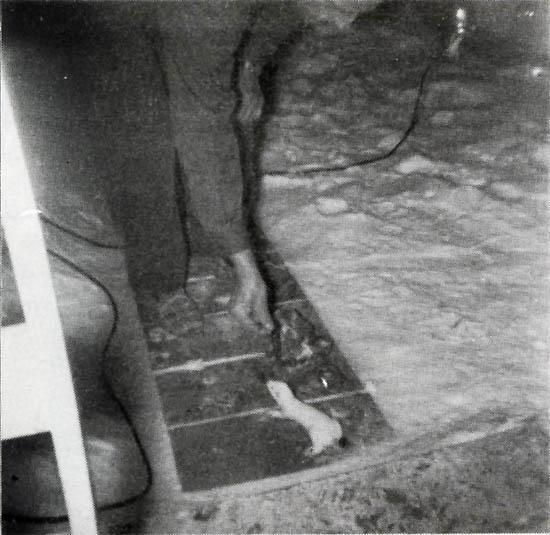
Picture 11-10A
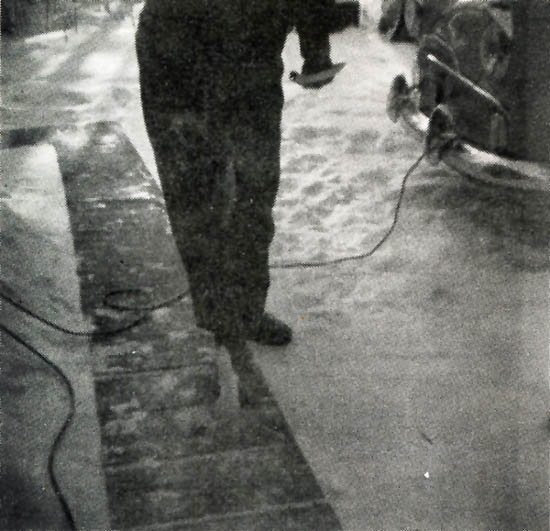
Picture 11-11

Picture 11-12

Picture 11-13

Picture 11-14

Picture 11-15

Picture 11-16

Rod and Toni bought their first car while they lived at Pine Falls. The company often sent employees to study courses to enable them to upgrade or update their training. On a number of occasions, Rod was sent to sister plants in Ontario to such courses. When it was possible, time and weather factors permitting, he would drive and Toni would accompany him. The many lonely days, weeks and months they had been separated in earlier years they now tried to compensate for. Their time together was precious, and they chose not to waste any of it (Sketch 11 - 1, Picture 11 - 17).
Sketch 11-1 Sketch of pulp mill in Pine Falls, drawn by Eileen Schuetze
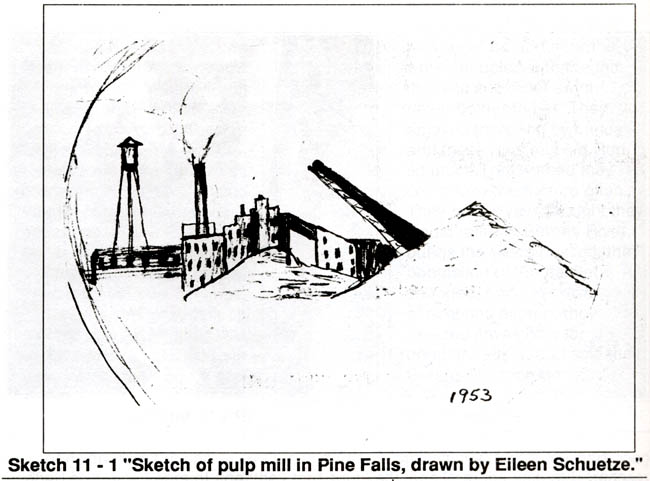
Summer vacations saw them revisit Berens River. It was still home in so many ways, and returning was a pleasure in itself, but having kept their cabin in the settlement meant they could re-enact some of the activities they had taken for granted in years gone by. Since Pine Falls was located on the Winnipeg River, they launched their canoe, with the outboard motor in place, and followed the river to it's confluence with Lake Winnipeg. From there it was a trip on the lake, bringing back memories of other times and old friends.
Toni remembered the many times they had sailed on the lake - she had always been subject to motion sickness, not a tendency she had outgrown with time. Somehow, all the time they had spent on and near the water, coupled with the fact that she could not swim, never bothered her. They enjoyed travelling by canoe and these trips relaxed Rod so much Toni wished they could take them more often. They had always thought they would retire in Berens River, but as the years passed, the population of the hamlet changed, and their own aspirations altered, they realized it was time for another setting, and sold their Berens River property.
Picture 11-17 Rod and Toni in the living room of their home in Pine Falls
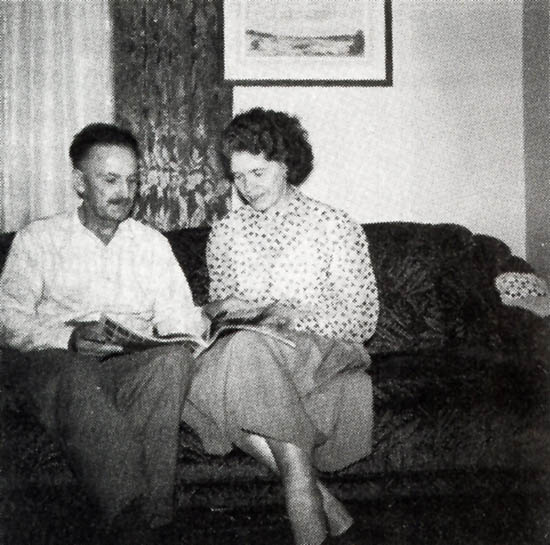
Rod's retirement was looming. He would have a good pension from the company - the Old Age Security would begin when he reached sixty-five years of age, they had some savings from the sale at Berens River, and there was their little cabin at Nutimik Lake to sell, as well. Their travels through northern Ontario had sparked interest in the area - the lakes, rivers and bush country was their type of terrain. Here they could re-live many of their earlier experiences and still enjoy being self-sufficient and independent. Driving through the area, both on main and side roads, and into the isolated sections, they found what they were seeking: a building site on a beautiful lake, surrounded by nature at her best, and with the potential for them to make it truly "their home." They found the owner and struck a deal. Now they both looked forward to Rod's retirement - they had a house to plan, a new lake to explore, flowers and vegetables to grow! Would there be enough hours in the day for them to accomplish the many, many things they wished to do?
  
____________________________________________________________________________
©1992,2006,2007 E.Woytowich
|